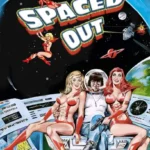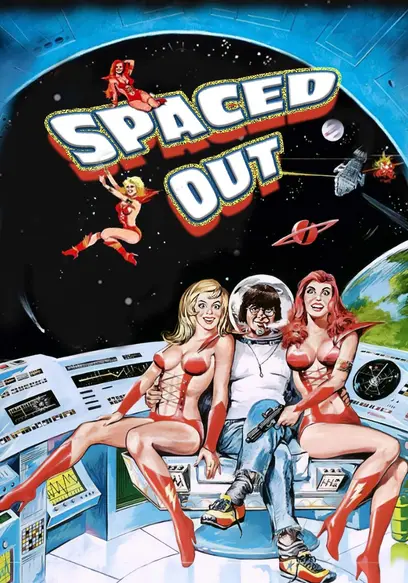 Spaced Out (1979), directed by Eddie Davis and starring Crispin Glover, Patty Shepard, and George ‘Buck’ Flower, is a film that revels in its own absurdity, creating a viewing experience that is both bizarre and unexpectedly entertaining. From the opening moments, it’s clear that Spaced Out is not a movie that takes itself seriously. Instead, it embraces the ridiculousness of its premise, delivering a chaotic, laugh-out-loud blend of science fiction and comedy that earns its status as an “awesome terrible” movie. This is the kind of film where logic is optional, special effects are charmingly low-budget, and performances range from hilariously over-the-top to unintentionally awkward.
Spaced Out (1979), directed by Eddie Davis and starring Crispin Glover, Patty Shepard, and George ‘Buck’ Flower, is a film that revels in its own absurdity, creating a viewing experience that is both bizarre and unexpectedly entertaining. From the opening moments, it’s clear that Spaced Out is not a movie that takes itself seriously. Instead, it embraces the ridiculousness of its premise, delivering a chaotic, laugh-out-loud blend of science fiction and comedy that earns its status as an “awesome terrible” movie. This is the kind of film where logic is optional, special effects are charmingly low-budget, and performances range from hilariously over-the-top to unintentionally awkward.
The premise of Spaced Out is as delightfully absurd as it sounds. A group of unlikely characters—including humans, aliens, and sentient robots—find themselves thrust into a series of intergalactic misadventures. Their mission, such as it is, is loosely tied to saving the universe, avoiding extraterrestrial threats, or navigating the occasional love triangle. Along the way, the story plunges into chaos: inexplicable scientific phenomena, improbable chases, and dialogue so awkward it becomes comedic gold. The plot is a series of escalating absurdities, with each scene building on the previous one in a domino effect of ridiculousness.
Crispin Glover, in one of his early roles, delivers a performance that perfectly straddles the line between intentional eccentricity and unintentional hilarity. His portrayal of the lead character is at once intense and bizarre, with an energy that drives the film forward even when the narrative logic falls apart. Glover’s expressive gestures, oddball dialogue delivery, and commitment to the absurd situations he faces make him the perfect anchor for a story that could easily have collapsed under the weight of its own chaos. Watching Glover navigate the film’s wild scenarios is both mesmerizing and entertaining, a reminder that charisma can elevate even the most ridiculous material.
Patty Shepard, as the female lead, provides charm and comic relief, her reactions to the increasingly improbable events offering some of the film’s most hilarious moments. Shepard’s performance ranges from exasperated disbelief to over-the-top emotional expressions, perfectly complementing Glover’s eccentricity. Together, the lead actors create a dynamic that is chaotic, humorous, and oddly compelling, keeping the audience engaged despite the film’s narrative absurdities.
George ‘Buck’ Flower, in a supporting role, adds an extra layer of comedy with his characteristic deadpan humor. Flower’s presence amplifies the film’s quirky energy, particularly during scenes that involve physical comedy, improbable mishaps, or interactions with bizarre alien characters. His ability to play absurdity straight provides a counterbalance to the more exaggerated performances, making the chaos even funnier. The supporting cast as a whole embraces the film’s ridiculous premise, committing fully to every improbable scenario and exaggerated exchange.
The humor in Spaced Out is unapologetically juvenile, slapstick, and often absurd. From intergalactic battles that look like school plays to awkward attempts at romantic tension, the film finds comedy in the most unexpected places. Its absurdity is heightened by the low-budget visual effects, including wobbly spaceship models, flashing lights, and deliberately cheesy alien costumes. While these effects might have been considered flaws in a serious sci-fi film, in Spaced Out, they are central to the entertainment, turning each sequence into a visual gag that is as endearing as it is ridiculous.
The film’s narrative pacing is relentless, moving from one outrageous scenario to the next with barely a pause for logical explanation. Characters are constantly thrown into escalating chaos, whether fleeing alien attackers, accidentally activating malfunctioning technology, or misunderstanding the motives of extraterrestrial allies. This constant escalation keeps viewers engaged, ensuring that the audience is never quite sure what absurdity will happen next. The lack of narrative restraint is one of the film’s defining features, creating a manic energy that makes every moment unpredictable and entertaining.
Director Eddie Davis approaches the material with an admirable commitment to absurdity. The camera work emphasizes exaggerated gestures, chaotic action, and comedic timing, while editing choices heighten the absurdity of each scene. The film’s tone oscillates between slapstick, melodrama, and pure silliness, creating a cinematic experience that is both chaotic and oddly coherent in its own logic. The direction ensures that even when the story defies sense, the audience is entertained by the sheer audacity of the filmmaking.
Visually, Spaced Out is a delightfully chaotic blend of low-budget sci-fi aesthetics. The spaceship interiors, alien landscapes, and futuristic gadgets are designed with an eye for spectacle rather than realism, creating a world that is colorful, exaggerated, and consistently funny. Costume and makeup choices exaggerate character traits, social roles, and alien designs, making every scene visually memorable. Even when the effects look dated or implausible by modern standards, they add charm and reinforce the film’s identity as an over-the-top adventure.
The dialogue, often stilted and awkward, contributes to the film’s comedic impact. Lines intended to convey serious exposition or romantic tension frequently land as unintentionally hilarious, creating moments of cringe-worthy comedy that are essential to the film’s appeal. Characters deliver exposition in a deadpan manner, interact with bizarre logic, and react to absurd situations as if they were normal, heightening the tension between intent and execution. This contrast between earnest performance and ridiculous scenarios is at the heart of Spaced Out’s “awesome terrible” charm.
The film’s supporting characters contribute significantly to the chaos and comedy. Aliens with improbable motives, bumbling scientists, and eccentric sidekicks all play roles in escalating absurdity. Their over-the-top performances, improbable behavior, and reactions to escalating chaos provide constant entertainment, creating a web of narrative complications that is as ridiculous as it is fun to watch. Each new character adds a layer of unpredictability, ensuring that viewers are always engaged and often laughing at the sheer audacity of the story.
One of the most memorable aspects of Spaced Out is its commitment to physical comedy and over-the-top action. Spaceships wobble, characters fall, objects fly through the air, and improbable technology malfunctions in spectacularly ridiculous ways. These sequences are choreographed with maximal chaos in mind, ensuring that every scene is visually engaging and comically absurd. The film’s energy, particularly during these moments, is infectious, making it impossible not to enjoy the spectacle even while acknowledging its flaws.
Thematically, Spaced Out touches on classic sci-fi motifs—adventure, discovery, and the consequences of meddling with forces beyond one’s understanding—but these themes are presented in a deliberately exaggerated and humorous manner. The film never takes its own morality or scientific logic seriously, instead prioritizing entertainment, chaos, and spectacle. This approach allows the narrative to explore absurd scenarios with abandon, making it a fun and unpredictable ride.
The soundtrack, a mix of synthesized electronic cues and dramatic musical swells, complements the film’s tone perfectly. Music is used to heighten suspense, punctuate comedy, and underscore absurd action sequences, contributing to the manic energy that defines the film. The score reinforces the visual and narrative chaos, amplifying the humor and absurdity at every turn.
While Spaced Out is undeniably flawed—its plot often defies logic, performances range from exaggerated to awkward, and effects are charmingly low-budget—these imperfections are inseparable from its appeal. The film’s audacity, chaotic energy, and commitment to ridiculous scenarios make it endlessly entertaining. Its flaws are not distractions; they are central to what makes Spaced Out a memorable example of “awesome terrible” cinema.
The film’s enduring charm lies in its willingness to fully embrace absurdity. Every character, line of dialogue, and visual gag contributes to an experience that is chaotic, unpredictable, and hilariously entertaining. For viewers who enjoy films that are so outrageous, awkward, and over-the-top that they become fascinatingly watchable, Spaced Out delivers in spades. It is a movie that delights in its own ridiculousness, turning flaws into features and absurdity into entertainment.
Ultimately, Spaced Out is a film that defies expectations and revels in chaos. It is bizarre yet engaging, awkward yet oddly compelling, ridiculous yet endlessly entertaining. Crispin Glover, Patty Shepard, and the supporting cast navigate the absurd narrative with energy and commitment, ensuring that the film remains memorable despite—or perhaps because of—its flaws. From intergalactic mishaps to absurd dialogue and low-budget effects, every element contributes to a viewing experience that is chaotic, hilarious, and uniquely charming.
For fans of “awesome terrible” cinema, Spaced Out offers an unforgettable journey through absurd sci-fi adventures, over-the-top performances, and visual gags that are as ridiculous as they are entertaining. It is a movie that makes audiences laugh, cringe, and marvel at the audacity of its premise—an unforgettable example of late ’70s low-budget sci-fi comedy.
This post has already been read 276 times!





